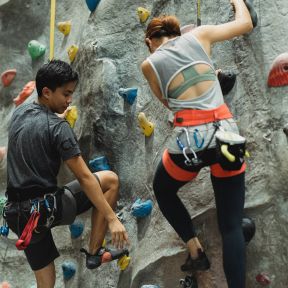MOTIVATION- Goal-Oriented Challenges. The solution to the teen mental health crisis?

KEY POINTS-
- Screens crowd out real-world activity, where challenge and meaning are to be found.
- Teens need goal-oriented challenges and activities in the offline world.
- Goal-oriented challenges can help satisfy basic psychological needs for autonomy, competence, and relatedness.
In my previous post ("Why Are Teens Suffering?"), I argued that the alarmingly high depression and distress measured in today’s teens (compared to prior cohorts) is related to their excessive screen use, which necessarily “crowds out” time in the real world, where true meaning and challenge are to be found.

I also presented fresh data showing that while young people spend the most time in social media use (compared to face-to-face interactions and solitary time), social media use was the activity they least identify with (i.e., lowest meaning) and have the least intrinsic motivation for doing (i.e., lowest challenge). In self-determination theory terms (Ryan & Deci, 2017), there was a strong absence of autonomous, positive motivation for social media use, despite its seeming popularity.
The Low-Energy Paradox
These surprising findings suggest that compulsive internet users, a category dominated by youths, may be “stuck” in a low-energy, unsatisfying state. Their overuse of screens functions both as an impediment to their offline life and as a coping mechanism that helps fill the resulting void. Screens help make them “comfortably numb,” but fail to address the underlying problem.
Somehow, the kids need to be raised up, to a new state—one in which they are more fully engaged and involved in their off-line lives. But how?
The Importance of Goals—Even Short, Easy Ones
I’ve spent my career researching people’s self-generated personal goals (like “become an electrical engineer!” or “complete this marathon!” or “totally change my diet!”). I’ve found that goals can have huge effects in peoples’ lives—just stating a goal out loud primes your nonconscious mind to start thinking about it and working on it, and gives you energy and forward momentum. Such pursuits can even lead people to “upward spirals” of ever greater happiness and satisfaction (Sheldon & Houser-Marko, 2001).
But not everybody is ready to “state a grand life purpose and seize the day.” When we’re really stuck, just getting out of bed can be a challenge. Maybe sometimes we just need to do or learn something new—almost anything. Take a dance lesson or learn to do a magic trick. Go on a kayak adventure, learn a yoga posture, or take a photography class.
Many such new activities might be “one and done”—worth checking out and checking off, but that’s all. But other activities might turn into lifelong passions—acquiring a momentum of their own, leading us forward. As a young man, I was amazed by the beauty of the mountains I was hiking in. After taking a photography class, I had a whole new way to enjoy the scenery—and I still have it.
Here’s what youths are really missing, in my view: goal-oriented challenges (GOCs), out in the real world. At this period in their lives, they need to be trying their hand at things, the more the better. Such experimentation—of finding out what one likes or dislikes, what one might be good at—is critical to personality development. As we now know, humans are largely responsible for growing themselves, via the choices they make as agents and via the energy they invest in those choices.
Toward a Solution
Good challenges and opportunities can be hard to find. Obviously, youths are influenced primarily by their limited network of friends (many of whom are also hooked on screens) or by their immediate family. There’s so much they don’t know they don’t know! How can they browse what’s possible?
Some companies are addressing these issues. For example, DoCurious offers an online marketplace for GOCs—that is, concrete skills or tasks to be mastered to (a) help engage youth in the real world and reduce their screen time, (b) expose them to the full range of activities available in the world, and (c) put them on “upward spirals” of growth and development.
Stated in terms of self-determination theory principles, GOCs can help youth to find activities for which they have intrinsic (challenge-based) motivation and identified (meaning-based) motivation. This search for truly “self-concordant” goals requires considerable experimentation (Sheldon, 2014) but can supply very rich rewards.
Finally, GOCs can also help people to satisfy their basic psychological needs for autonomy, competence, and relatedness, by enabling them to (1) do activities of their choosing (autonomy), (2) experience success at those activities (competence), and (3) make new friends along the way (relatedness). Goals, even just short, easy ones, are the way to go! And baby steps can lead to giant strides.
- Questions and Answers
- Opinion
- Motivational and Inspiring Story
- Technology
- Live and Let live
- Focus
- Geopolitics
- Military-Arms/Equipment
- Безопасность
- Economy
- Beasts of Nations
- Machine Tools-The “Mother Industry”
- Art
- Causes
- Crafts
- Dance
- Drinks
- Film/Movie
- Fitness
- Food
- Игры
- Gardening
- Health
- Главная
- Literature
- Music
- Networking
- Другое
- Party
- Religion
- Shopping
- Sports
- Theater
- Health and Wellness
- News
- Culture

